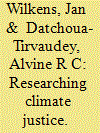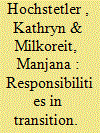|
|
|
Sort Order |
|
|
|
Items / Page
|
|
|
|
|
|
|
| Srl | Item |
| 1 |
ID:
167136


|
|
|
|
|
| Summary/Abstract |
Global climate governance still faces serious challenges despite the epochal Paris Agreement of 2015. Whether and how the world will reach the targeted 1.5-degree limit remains difficult to foresee, although undoubtedly one of the necessary conditions is greater cooperation among the major greenhouse gas (GHG) emitting nations. In this light, the decision by the USA, the second largest GHG emitter in the world, to withdraw from the Paris Agreement has significant global ramifications. Another source of uncertainty is the European Union’s climate policy, which has long been a role model for the world; it will likely have to undergo major changes as a result of the UK’s exit from the EU, which is projected to take place in 2019. Against this backdrop of profound geopolitical changes, this article argues that strengthened cooperation between the EU and China—the world’s largest GHG emitter, but also its largest investor in renewable energy and an increasingly vocal voice for climate action—is indispensable for meaningful climate change mitigation and adaptation in the decades ahead, even if the end results still fall short of the ambitions outlined in the Paris Agreement. Diverging economic and political interests still exist, but there is also much common interest and ample room for collaboration. We review the progress and challenges in EU-China cooperation on climate change and put forward practical suggestions for plausible future directions.
|
|
|
|
|
|
|
|
|
|
|
|
|
|
|
|
| 2 |
ID:
184095


|
|
|
|
|
| Summary/Abstract |
Over the past few decades, cities have become increasingly active in global climate governance. Although most research on city agency has focused on democratic (often Western) cities, the climate-related activities of Chinese cities in global city networks have also expanded, raising the question of whether cities from nondemocratic political systems can be international actors or whether they are merely extensions of their national governments. This article examines how the Chinese Party-state’s institutions and governing instruments shape cities’ global agency and how these structures impact the work of various city networks operating in China. To this end, it analyzes policy reports, documents, and original interview data collected from city network representatives. The findings demonstrate that city networks in China walk a fine line between their door-opening function for cities to global climate governance and their role as transmitters of the central government’s gatekeeping function, thereby sustaining the hierarchical control structures of the Chinese Party-state.
|
|
|
|
|
|
|
|
|
|
|
|
|
|
|
|
| 3 |
ID:
104288


|
|
|
|
|
| Publication |
2011.
|
| Summary/Abstract |
One year after the failure of the Copenhagen Climate Summit, the next conference of the parties to the UN Framework Convention on Climate Change and the Kyoto Protocol in December 2010 adopted the so-called Cancun Agreements. Thereby, the Cancun conference succeeded in keeping the UN climate process alive and averting serious damage to multilateralism more broadly. However, the Cancun Agreements fall seriously short of providing for effective action on climate change. The current weakness of the international framework reinforces the rationale for strengthening domestic EU climate policies. It also requires a further rethinking of the EU's international leadership strategy.
|
|
|
|
|
|
|
|
|
|
|
|
|
|
|
|
| 4 |
ID:
192745


|
|
|
|
|
| Summary/Abstract |
This study innovatively divided consumption-based CO2 emissions of developed countries into domestic and foreign components using an environmentally extended multi-regional input–output model, and revealed their different driving factors using the structural decomposition analysis method. The results showed that the consumption-based emission peaked in 16 developed countries, with 14 countries peaking around 2008. Domestic emissions in all 16 developed countries had peaked, most of which accounted for 40–70% of the total consumption-based emissions. However, the foreign emissions driven by 9 peaking countries still kept increasing. Regarding domestic emissions, the decline of domestic carbon intensity was the main driving factor across 16 peaking countries. In terms of foreign emissions, carbon intensity decline, especially in main medium- and low-income countries, was the dominant factor in the CO2 emissions decrease. Significant improvements in production technology levels of medium-income countries played a key role in weakening the carbon-increasing effects of foreign emissions during the post-peak period. Thus, to further promote global carbon emissions to peak as soon as possible, peaking developed countries should provide more emission reduction funds and technologies to support the decline in carbon intensity and the improvement of production technology in medium- and low-income countries.
|
|
|
|
|
|
|
|
|
|
|
|
|
|
|
|
| 5 |
ID:
157228


|
|
|
|
|
| Summary/Abstract |
Much of the literature in the field of international relations is currently concerned with the changing patterns of authority in world politics. This is particularly evident in the policy domain of climate change, where a number of authors have observed a relocation of authority in global climate governance. These scholars claim that multilateral treaty making has lost much of its spark, and they emphasize the emergence of transnational governance arrangements, such as city networks, private certification schemes, and business self-regulation. However, the different types of interactions between the various transnational climate initiatives and the intergovernmental level have not been studied in much detail and only recently attracted growing scholarly interest. Therefore, the present article addresses this issue and focuses on the interplay between three different transnational climate governance arrangements and the international climate regime. The analysis in this article underscores that substate and nonstate actors have attained several authoritative functions in global climate policy making. Nevertheless, the three case studies also demonstrate that this development does not imply that we are witnessing a general shift of authority away from the intergovernmental level toward transnational actors. Instead, what can be observed in global climate governance is an ongoing reconfiguration of authority, which apparently reaffirms the centrality of the international climate regime. Thus, this article points to the need for a more nuanced perspective on the changing patterns of authority in global climate governance. In a nutshell, this study shows that the international climate regime is not the only location where the problem of climate change is addressed, while it highlights the persistent authority of state-based forms of regulation.
|
|
|
|
|
|
|
|
|
|
|
|
|
|
|
|
| 6 |
ID:
183867


|
|
|
|
|
| Summary/Abstract |
This article addresses the broader question of the special issue by reflecting on the coloniality of knowledge production in a context of global climate governance. Drawing on the rationale of the special issue, we highlight key dynamics in which knowledge shape climate policies and propose a decolonial approach at the nexus of academic knowledge production and policy formation by accounting for diverse ways of knowing climate justice. To this end, the article asks how to develop a decolonial approach to researching climate justice in order to identify the meaning-in-use of climate justice by affected people in what we describe as sensitive regions of the Arctic and the Mediterranean. To this end, the article develops a research design that accounts for diverse ways of knowing. The article proceeds as follows: first, we will discuss how diverse ways of knowing are related to global climate governance and climate justice; second, we outline our practice-based research framework that addresses research ethics, decolonial approaches and norm contestation; and third, we discuss how our approach can inform not only the co-production of research in climate governance, but also current debates on climate justice.
|
|
|
|
|
|
|
|
|
|
|
|
|
|
|
|
| 7 |
ID:
138817


|
|
|
|
|
| Summary/Abstract |
The BASIC countries (Brazil, South Africa, India, and China) play an increasingly prominent role in global climate negotiations. Climate governance spotlights burden-sharing arrangements, asking countries to take on potentially costly actions to resolve a global problem, even as the benefits are generally indivisible public goods. This article examines the BASIC countries’ own Joint Statements and their individual and collective submissions to multilateral climate negotiations to identify the rationalist and principled arguments they have made about the climate burden-sharing requirements that developed countries, developing countries, and they themselves should face in global climate governance. It argues that their expectations for their own role are particularly unclear, with greater national action than international commitments to do so.
|
|
|
|
|
|
|
|
|
|
|
|
|
|
|
|
|
|
|
|
|